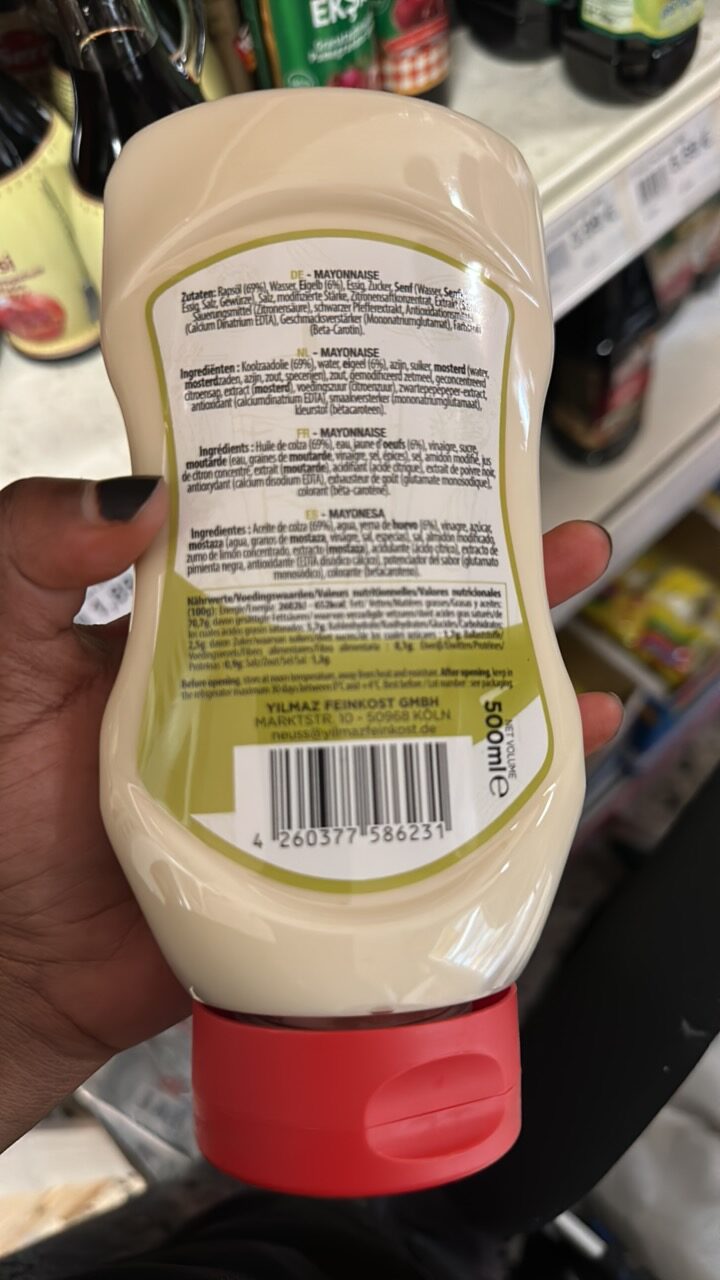
Barcode: 4260377586231
mayonnaise
HALAL
📝 Reason: Most ingredients in this mayonnaise are plant-based and Halal, such as rapeseed oil, egg yolk, sugar, MSG, and beta-carotene. However, ingredients like ‘extract’, ‘acid’, ‘black pepper extract’, ‘antioxidant’, ‘flavor enhancer’, and ‘coloring agent’ are generic names that lack information about their origin or processing. They could contain Haram solvents or animal derivatives making them Doubtful under strict Halal standards, especially as no Halal certification is specified. In Islamic law (see Quran 5:3), questionable ingredients should be avoided without clear evidence of Halal sourcing. For unknowns, many scholars advise caution unless certified (see IFANCA FAQs: https://www.ifanca.org/consumer/faqs/; www.foodchemadditives.com).
🏷️ Category: Condiment
📄 Certificates: 500Ml, Vegetarisch
Ingredients:
Details
Understanding the Halal Status of Mayonnaise
Mayonnaise is a popular condiment enjoyed worldwide, but for those adhering to a Halal diet, understanding its Halal status is crucial. In this post, we’ll dive deep into the ingredients of mayonnaise to ascertain whether they meet Halal standards.
What Makes Mayonnaise Halal?
The primary ingredients in mayonnaise include:
- Rapeseed Oil: Pure vegetable oil, plant-based, and Halal unless contaminated. More Info
- Water: Water is intrinsically Halal and pure. More Info
- Egg Yolk: Eggs from non-haram birds like chicken are Halal. More Info
- Vinegar: Mayonnaise typically uses vinegar that is Halal; however, confirm it isn’t derived from alcohol. More Info
- Sugar: Generally plant-derived and Halal. Ensure it’s not processed with bone char, which is rare nowadays. More Info
- Mustard: Mustard is typically Halal. More Info
- Salt: A mineral that is inherently Halal. More Info
- Spices: Most spices are Halal unless they contain alcohol or pork-based flavorings. More Info
- Modified Starch: Halal if derived from plant sources; most commercial varieties are plant-based. More Info
- Lemon Juice Concentrate: Derived from fruit, thus Halal. More Info
Ingredients That Raise Concerns
While the majority of ingredients are Halal, certain items raise red flags:
- Extract: This is a generic term and may contain alcohol or non-Halal solvents. Due to this uncertainty, it’s advisable to be cautious. More Info
- Acid: Also a generic label that lacks clarity about whether it is natural or synthetic. Uncertainty arises over its E-code application. More Info
- Black Pepper Extract: If extracted with alcohol solvents, its Halal status becomes doubtful. More Info
- Antioxidants and Coloring Agents: These terms are generic and their sources often remain unspecified. Toxic E-codes may indicate they are doubtful or even Haram. More Info
Analyzing E-Numbers in Mayonnaise
Notably, some E-numbers found in manufactured mayonnaise include:
- Citric Acid (E330): Typically derived from fermenting sugar solutions, making it Halal. More Info
- Monosodium Glutamate (E621): Generally made by fermentation or synthesis, thus being Halal. More Info
- Beta-Carotene (E160a): A plant-derived coloring, hence Halal. More Info
Conclusion
The Halal status of mayonnaise can be complex, as a significant amount of ambiguity surrounds certain ingredients. Most components of mayonnaise are Halal, yet others can introduce uncertainty. It’s advisable for consumers to look for halal certification on products for peace of mind. Always seek confirmation from the manufacturer regarding the source of ingredients, particularly those with generic names. Enjoy your mayonnaise thoughtfully and stay informed!
